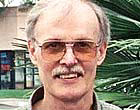David Chappell, 64; Scholar Applied Buddhism
to Peace Efforts, Dies
LA Times Staff Writer / 12-8-2004
***
 David
Wellington Chappell, an author, scholar and educator on the
history of Buddhism, a peace advocate and the principal founder
of the Society for Buddhist-Christian Studies, has died. He
was 64.
David
Wellington Chappell, an author, scholar and educator on the
history of Buddhism, a peace advocate and the principal founder
of the Society for Buddhist-Christian Studies, has died. He
was 64.
Chappell died Thursday of heart failure in Laguna Hills.
A professor of religion at the University of Hawaii for three
decades, Chappell moved to Southern California in 2000 to
become professor of comparative studies at Soka University
of America in Aliso Viejo.
He helped create the Society for Buddhist-Christian Studies
in the 1980s and served as founding editor of its journal,
Buddhist-Christian Studies.
Chappell, who earned several grants from peace organizations,
worked throughout his life to apply religious teachings to
achieving peace in troubled areas of the world. His books
often embraced that effort.
In 2001, he published "Buddhist Peacework: Creating Cultures
of Peace," after soliciting essays from religious and
lay leaders. The concept for the book sprang from a 1994 UNESCO
conference on how religion could help promote peace.
In reviewing the book, the International Journal on World
Peace said that Chappell "has very skillfully drawn together
essays from some of the leading figures of contemporary Buddhist
thinking…. This is a useful book both for those who are
familiar with Buddhist thought but are interested in its social
applications, especially in peacemaking, and for those who
know less of the philosophy."
Chappell's other books include "Buddhist and Taoist Practice
in Medieval Chinese Society," "Tien-Tai Buddhism:
An Outline of the Four-Fold Teachings" and "Unity
in Diversity: Hawaii's Buddhist Communities."
A Canadian native, Chappell earned his bachelor's degree from
Mount Allison University, his bachelor's of divinity from
McGill University and a doctorate in the history of religions
from Yale.
He is survived by his wife, Stella; a son, Mark; daughters
Cindy Rice, Laura Demitria, Gwen Demitria and Jeanne Barnes;
a brother, Gordon; and five grandchildren.
A celebration of his life is planned for June during the international
conference of the Society for Buddhist-Christian Studies at
Los Angeles' Loyola Marymount University.
***
David
W. Chappell
David W. Chappell was Professor of Comparative Religion at
Soka University of America and Professor Emeritus of the University
of Hawaii. His publications include: Buddhist and Taoist Studies
(1977); T'ien-t'ai Buddhism: An Outline of the Fourfold Teachings
(1983); Buddhist and Taoist Practice in Medieval Chinese Society
(1987); Unity in Diversity: Hawaii's Buddhist Communities
(1997); and Buddhist Peacework: Creating Cultures of Peace
(1999). After initiating a series of Buddhist-Christian conferences
in the 1980s, he became founding editor (1981-1995) of the
academic journal Buddhist-Christian Studies, founding Director
of the Buddhist Studies Progarm, UH (1987-1991), a co-founder
of the Society of Buddhist-Christian Studies (1988), and later
its President (1993-95). He was exploring the changing relationships
between religion, business, and government in our global society.
***

Is Tendai Buddhism Relevant to the Modern World?
David W. Chappell / 1987 / Japanese Journal of Religious Studies
(20 Pages - 370 KB)
Is
Tendai Buddhism Relevant to the Modern World? -- David
W. Chappell
Since
this year marks the 1200th anniversary of the establishment
of Tendai in Japan from China, there is no question that Tendai
is old. However, its long history naturally prompts the question
about Tendai's present and future. Is it frozen in outdated
forms from the past, or is it still changing and growing?
Having taken root in Japan, can it take root in the West?
Has it made its major contributions, or does it have anything
new to offer to the world? That is to say, what is the modern
relevance of Tendai Buddhism?
***
"The
Buddhadharma is not far off. It's as close as your mind. Reality
is not somewhere outside. How can you find it, if you turn
away from yourself. Whether you're deluded or awake depends
upon you. Make up your mind, and you will be there. Whether
you're in the light or in the dark doesn't depend on others.
Have faith and practice, and you will soon know the truth.
If you don't take the medicine of the Great Physician, when
will you see the light of the sun?" -- Ming-K'uang
-- Disciple of the Tien-tai patriarch Chang-an.